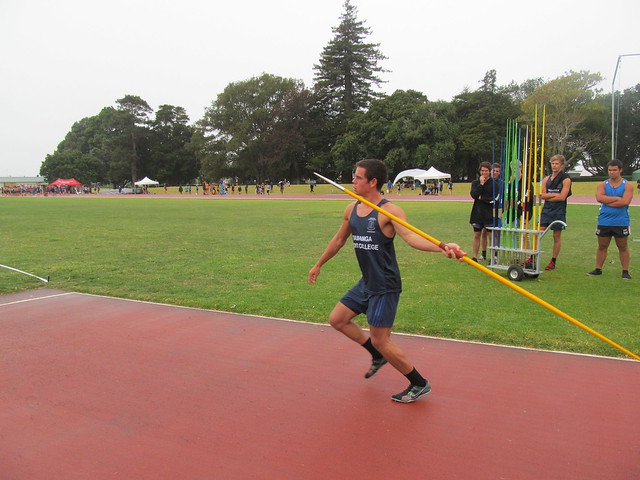Podcast: Play in new window | Download
In this episode we’re getting to grips with the word javelin.
A javelin is a light spear thrown with the hand and used as a weapon, or a metal-tipped spear thrown for distance in an athletic field event. It comes from the Old French javelline (javelin), a diminutive of javelot (javelin), from the Vulgar Latin *gabalottus (spear), from the Gaulish *gabalos (fork), from the Proto-Celtic gablā- (fork, forked branch), from Proto-Indo-European *gʰabʰlos (fork, branch of tree) [source].
Related words in modern Celtic language include:
- gabhal [ɡoːəl̪ˠ] = bifurcation, fork, crotch, junction in Irish
- gobhal [ɡoːəl̪ˠ] = bifurcation, fork, crotch, junction in Scottish Gaelic
- goal = fork, branch, crotch, crutch, junction, perineum in Manx
- gafl [gafl] = fork, stride, lap, inner part of the thigh, groin, angle, nook in Welsh
- gowl = crotch, fork in Cornish
- goal = fork in Breton
The English word gable comes from the same Gaulish root, via the Old French gable [source]. The English word gaffle (a lever used to bend a crossbow) possibly comes from the same Gaulish root, via Middle English gaffolle, the Middle Dutch gaf(f)el (fork) and the Proto-West Germanic *gabulu (fork) [source].
Words in other languages from the same Gaulish root include Gaffel (gaff) in German, gaffel (fork) in Danish, Swedish, Norwegian, and kahveli (gaff, fork) in Finnish [source].
More details of fork-related words in Celtic languages can be found on the Celtiadur, a blog where I explore connections between Celtic languages in more depth. I also write about words, etymology and other language-related topics on the Omniglot Blog.
You can also listen to this podcast on: Apple Podcasts, Amazon Music, Stitcher, TuneIn, Podchaser, PlayerFM or podtail.
If you would like to support this podcast, you can make a donation via PayPal or Patreon, or contribute to Omniglot in other ways.


The German word Gabel (fork) must come from the same root, too.
It does indeed.